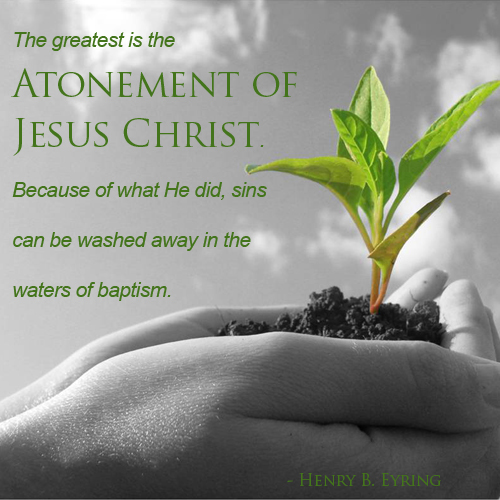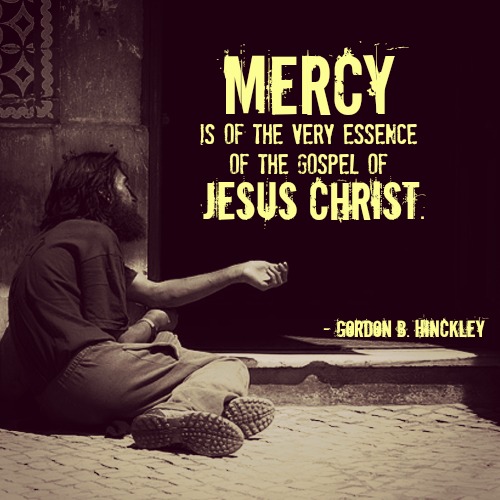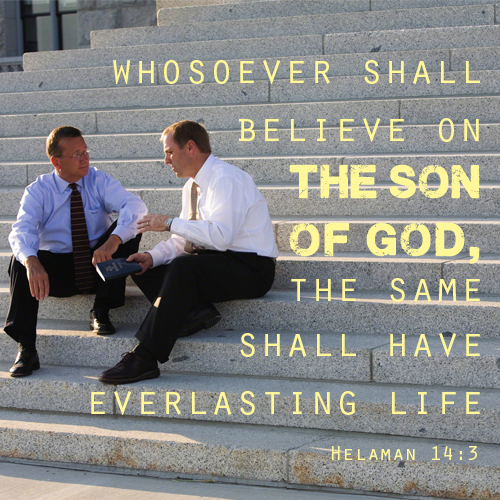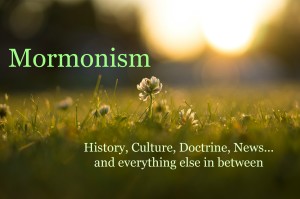The Book of Enos, found in the Book of Mormon, is one of the very shortest books in the volume. It is only one chapter and covers a single event in the life of the prophet Enos. Despite its brevity, however, it contains a powerful message about how the atonement of the Lord Jesus Christ changes everything.
Enos went into the forest to hunt beasts, although this may be an allegorical statement. As he was in the forest he began to think about the things his father had taught him concerning Jesus Christ, eternal life, and the joy of having a testimony. Those things sank deep into his heart and he felt a hungering in his soul.
 He knelt down there in the forest and began to pray, not an ordinary repetitious, dutiful sort of prayer, but one that came from the deepest places in his heart. He refers to what ensued as a wrestle before the Lord. He cried a full day and a full night to God for his soul.
He knelt down there in the forest and began to pray, not an ordinary repetitious, dutiful sort of prayer, but one that came from the deepest places in his heart. He refers to what ensued as a wrestle before the Lord. He cried a full day and a full night to God for his soul.
Finally a voice spoke to him, saying, “Enos, thy sins are forgiven thee, and thou shalt be blessed.” Enos knew God spoke the truth and so he felt his guilt swept away.
Answers to prayers can come slowly
Why did God let Enos pray so long before answering him? We know that what comes too easily to us is never really appreciated. We most value what we really struggled to gain and we learn the most from the struggle. Praying so long allowed Enos to find out just how badly he really wanted forgiveness and what he was willing to do to get it. By the time it came, he was fully appreciative of the difference of how he felt when he was overwhelmed by his sins and how he felt when they were taken away.
Many people, receiving that forgiveness, might have felt relieved—and tired—and gotten up to go home. Not Enos, though. Enos let the full power of that gift that comes from the atonement of Jesus Christ into his heart and let it change him. The first thing that happened was that he longed for blessings for those he loved. He stayed on his knees-and remember he’d already been on them a day and a night—and prayed for his own people, who were called the Nephites. He was worried because the enemy nation, the Lamanites, wanted not just to kill the Nephites, but to destroy their records so they would be forgotten by history.
God promised Enos that as long as the Nephites were being faithful Christians God would protect them from their enemies. However, if they turned their backs on Him, they were on their own. (Sadly, they would sometimes do that and finally be destroyed by the Lamanites.)
The atonement makes us loving
Reassured, Enos now found his heart so expanded that he wanted to pray even for his enemy. This is the power of completely accepting the atonement—you are filled with so much love you even want those you don’t like to have that same gift of joy you have. He prayed that even if the Nephites were completely destroyed, their records would be preserved so that someday they could be used to help convert the Lamanites, something the Nephites had tried unsuccessfully to do. (They would have some success with this over time.)
God also promised this to Enos, and of course, the records to which he referred are what we now call the Book of Mormon. It is important to understand that while some Mormons, including leaders, believed all Native Americans were Lamanites, this was not accurate and was not canonized. It was nothing more than personal belief. When there is no canonized doctrine, we’re free to enjoy coming up with our own ideas—God’s way of encouraging us to use the intelligence he gave us.
The mistaken belief comes about because the Book of Mormon, as we have it today, does not mention any native populations when the first settlers arrived. Of course, the book was abridged by the last two prophets of the book, and it is very likely mentions of them were simply removed in the interest of space. It would be as if I wrote my life story and didn’t mention my neighbors (something that is likely since I don’t interact with them much), and people decided I lived in an isolated area.
However, Mormon researchers have done population studies that show the people must have no only interacted, but converted and probably intermarried with the native population in order to grow so quickly. In addition, the end of the Book of Mormon includes a great battle. All but one Nephite was killed. When the war ended, the last remaining Nephite reported that the Lamanites just kept right on fighting—each other, this time. They loved to fight. This means it is likely there weren’t many of those people left, either. However, some of the Native Americans will have Lamanite ancestry, in amounts too small to show in DNA testing, which has been shown to be lost after a few generations when the sample was small to begin with.
The Book of Mormon is not just a book for them, anyway. It was written for our time to bring all people to a testimony of Jesus Christ. The story of Enos reveals just why that testimony matters so much. When the atonement really takes hold in our hearts, it changes hatred to love. It changes everything.
About Terrie Lynn Bittner
The late Terrie Lynn Bittner—beloved wife, mother, grandmother, and friend—was the author of two homeschooling books and numerous articles, including several that appeared in Latter-day Saint magazines. She became a member of the Church at the age of 17 and began sharing her faith online in 1992.





